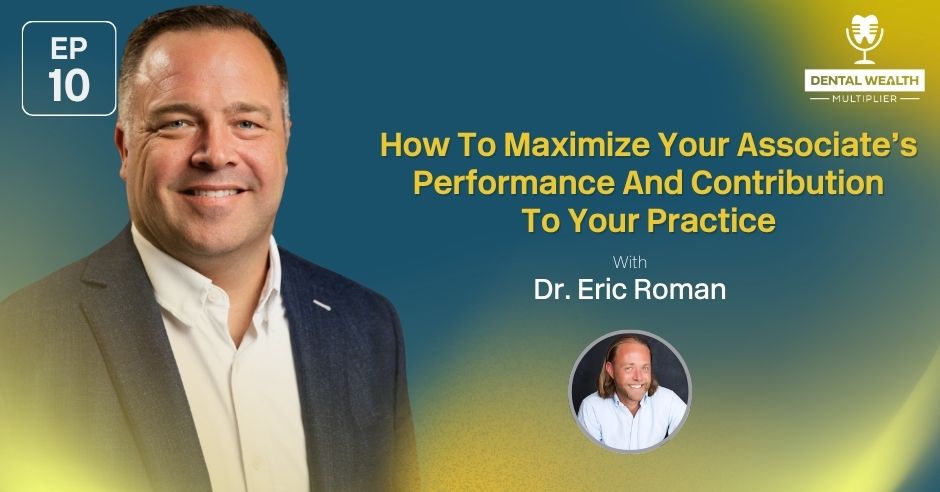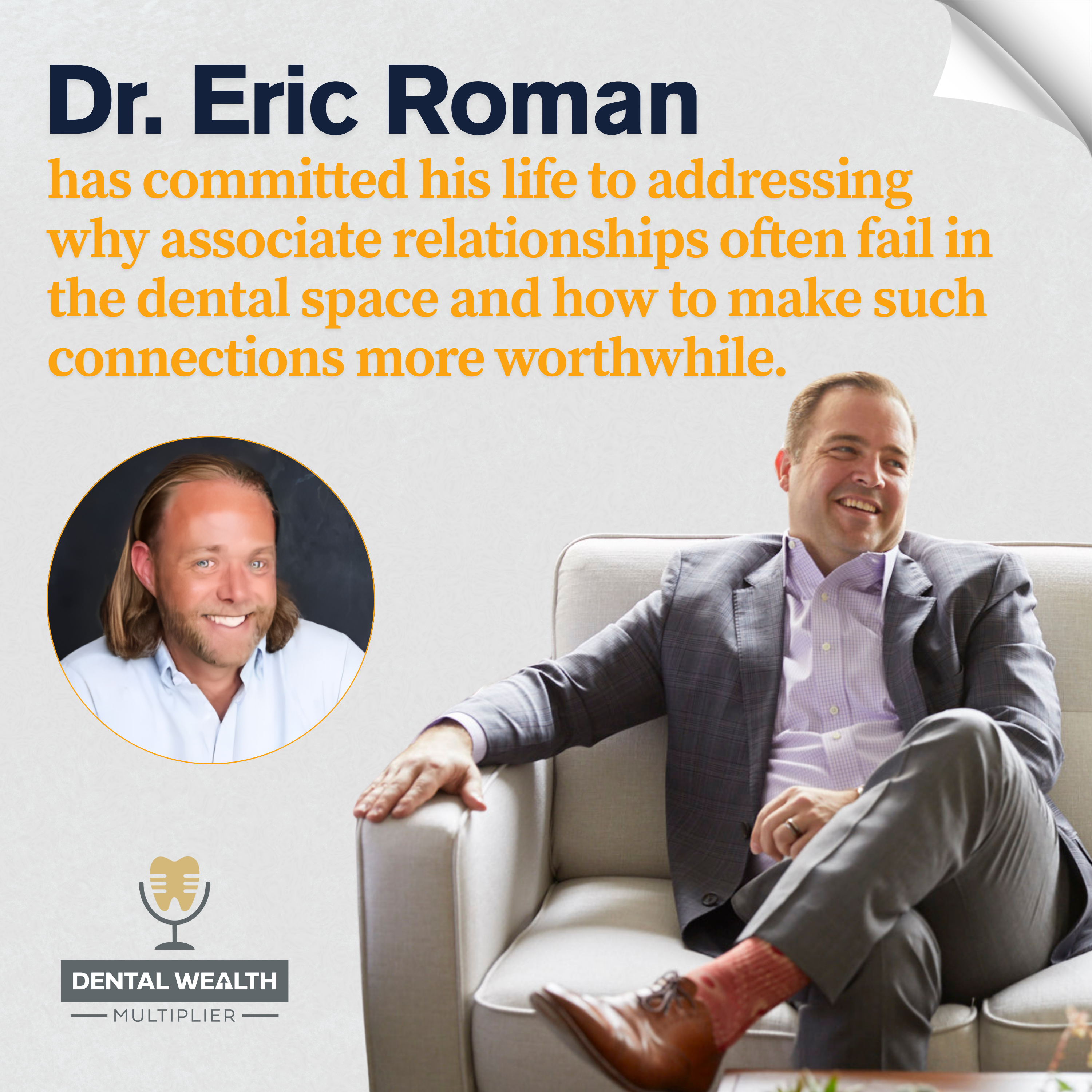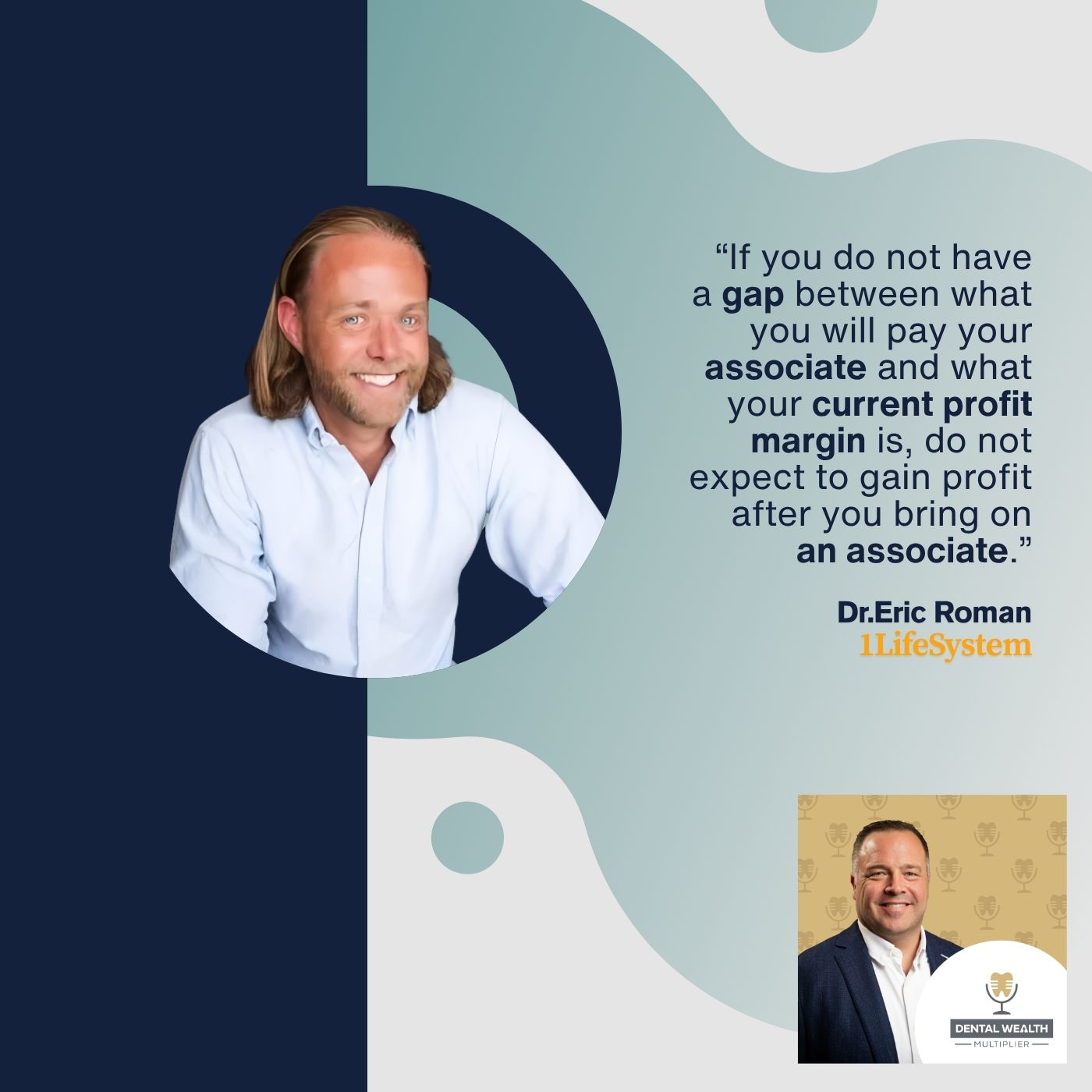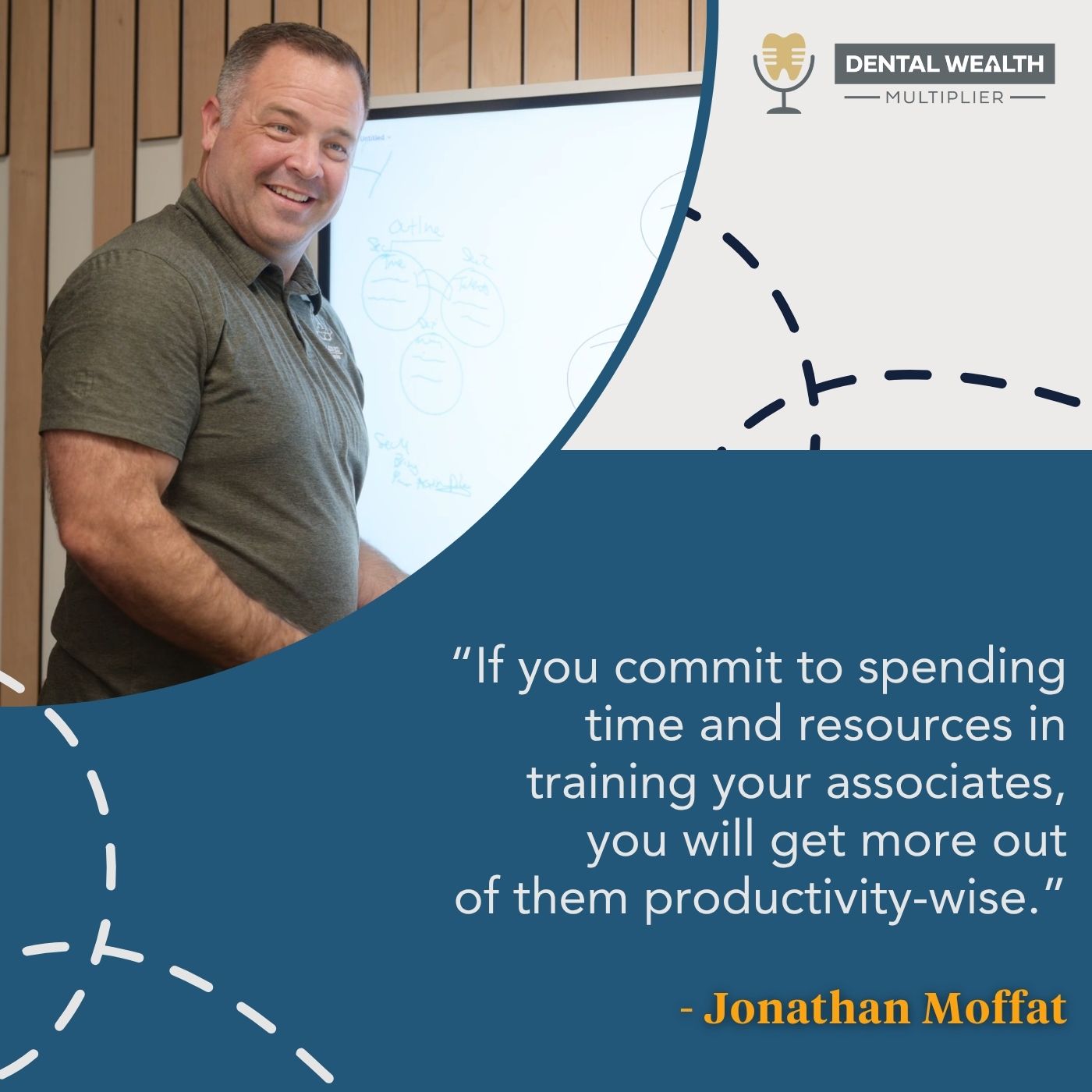
Jonathan Moffat and Dr. Eric Roman tackle the associate dilemma head-on, particularly now that more than 50% of dentists in the United States are associates. They break down why so many associate relationships fail, the financial myths that cost owners money, and what it takes to make hiring one work. They also discuss how dentists affect the professional growth and impact of their associates, which could greatly contribute to the progress of the entire practice. This is a real conversation about clarity, expectations, and the business model shifts most dentists are not making but really should.
Find Jonathan at jonathanmoffat.com
Learn more about Aligned Advisors at alignedadvisors.com
Connect with Dr. Eric Roman at drericjroman.com
Find Jonathan on LinkedIn: linkedin.com/in/jonathanmoffat1
Find Dr. Eric on LinkedIn: linkedin.com/in/drericjroman
Join us weekly as we explore what it really takes to grow your wealth while designing the life you want. Visit dentalwealthmultiplier.com for more!
—
Watch the Episode here
Listen to the Podcast here
How To Maximize Your Associate’s Performance And Contribution To Your Practice With Dr. Eric Roman
Understanding The Work Of Associates In Dentistry
Eric, this is one of the biggest topics. It’s a hot topic that gets brought up all the time. I know when you speak, it gets brought up. I know you have way more experience and a better success track record than I do. Why does this topic keep coming up after eight years, and continues to come up? I have a feeling it’s going to continue to come up.
The topic is associates. I am not going to lie. I have committed my life to this topic now. Your point was everywhere you go for years, it’s like, “What do I do about my associates,” or whatever the other line item is with it. It’s not changing. You said it’s probably going to be like that years from now. I think you’re right. Why are we there?
Is that having employees like the same thing, like the age-old challenge for business owners, always has and always will be having employees?
Great question. Is this a manifestation of owners complaining about employees? No, it’s not. This is an entirely unique situation. I need you to think about something for a moment. These employees have invested half a million to some of them, $750,000 plus to be your employee. This is a very different situation. They’ve been trained from the get-go that they’re a doctor, that they’re worthy, whether it’s rightful or wrongful, of special respect.
They have special knowledge. Society has given this unique role to them. I have a lot of people. I’ve committed the entire rest of my career to solving the relationship between associates and companies. That’s my commitment and my passion. I have people all the time who are like, “You cannot do it. There’s nothing you can do.” They’re like, “Give up, Roman. You’re screwed.” I’m like, “Why do people feel that way?”

That’s where we are. Your first question. Why does this matter? One, these aren’t just employees. These are employees who have to deal with and service a half-million-dollar-plus debt load that have a very unique set of expectations about what their professional license confers to them relative to a lifestyle, relative to expectations about what they know and what they do. We have a unique person set. Now we have a new situation that we’ve never had before in history.
That is that more than 50% of the dentists in the US right now are associates. How has that happened? You know and I know. It’s the perpetuation of the DSO model, and it has made good money for both of us. We’re not going to sit here and be like, “Woe to it.” We’re going to talk openly and honestly about pros and cons.
Now what’s happened is that these dentist associates who have these unique expectations, unique situations, are now thrust into a circumstance where they are employees. It used to be in the ‘80s, 99% of dentists went straight out and opened their own practice, or they bought a practice from a dentist that retired.
There was no such thing as associates or dentists even working together. That was super uncommon. We have a societal change in how everything works, and then we have the third thing. We have a demographic psychographic shift. Just like with anything, we’re dealing with a new persona, a new set of behaviors, a new set of like expectations for what life looks like.
We got all three of them happening at the same time, but then there’s the secret fourth thing. The fourth thing is that associates have never been in this position before, but our industry has also not been in this position. Our industry has never mastered this craft, this job of taking great care of employed dentists. That’s why we got a hot mess.
Overcoming Wrong Expectations About Associates
That’s a lot to unpack right there. That’s something I hear a lot, and I talk to associates. Almost every day, I’m talking to someone’s associate. When a client is like, “I want to buy,” usually it’s around what they want to buy in. Usually, the conversation I’m having is around buying into a client’s practice or looking to buy in.
I want to know the feasibility of buying in is generally what we’re looking at. I hear this a lot. “Jonathan, my teacher at dental school told me never to take a contract that’s less than 30% of production,” or I didn’t say collections. This is production. I heard one of the other day, “My professor said I should never have more debt than what would take five years to pay off or something like that.”
I hear this all the time. On one hand, I also hear this. I was talking to my colleagues. One of my colleagues bought in there super profitable after buying in their first couple of months. How come this isn’t the same case? A lot of times I’m like, “As far as your colleagues go, you can tell you more likely than not, they either don’t understand the deal that they’re in, or they’re leaving out. They’re Instagramming the scenario.
90%-95% of dental practice owners bring an associate because of the concept of making more money. Share on XThey’re making it sound better than maybe it actually is.” As far as the professor’s side, I think they’re doing the best to guide you, but they’re not out in the real world, seeing what’s happening. How do you overcome that when you’re like, we haven’t even begun the conversation, and we’re already starting with these pretty big preconceived notions of how things should be before they’ve even started?
Any reason why everything is failing? It’s because everybody has wrong expectations going into the agreement. Let’s talk about the third thing. Let’s look at the owner’s part. Why are 90% of the owners, 95% of the owners, bringing on an associate anyway? It’s because there’s a concept of making more money. Let’s be honest, they’re not bringing in an associate to lose money, even though most of them do.
The irony is they’re bringing in an associate because maybe their financial advisor or their accountant or somebody said, “I’ve got another client that’s making a ton of money by having associates. You should do that too.” “That’s why I’m not making as much money as I want. I need to have associates.” All three things are there. This is change management. In society at large, how do we change as we move from one thing to the next?
We do have to acknowledge where these expectations are coming from, and are these valid? The one thing that nobody brought up in there was, “Screw my professor’s ideology about this and my friends. What do I want? Would you know what I never encounter? I’ve interviewed hundreds of associates. In the last year, since I launched my associate-facing program, there have been well over a hundred associates that I’ve interviewed, and I’m asking probing questions.
Do you know what I haven’t encountered? I haven’t encountered an associate who’s clear on what they want their future to look like. When you don’t have any clarity, like when you don’t have a plan, when nobody is giving you one, you have to insert someone else’s. I did the same thing, Jonathan. I was no different. I was learning. It’s just that my plans came from dental economics, from my buddy Scott Luna reading about his experience, from Ryan Swain reading about crap on Dentaltown.
I was setting my expectations from a lot of their experiences, whether they were good, bad, or otherwise. I don’t feel like I had any guidance from dental school inside of that. I felt like they didn’t even set expectations. They’re like, “Just go work. Shut up and go to work.” This is challenge number one. It’s funny, Jonathan, that you say this because of my clinical director training program. For anybody who wants to grow through associates, it launches in June of this year.
The very first thing we spend an entire day of training on is setting realistic, clear, bilaterally accepted expectations. That’s the number one thing. Two people have to be on the same sheet of music. Honestly, the reason that’s the first thing we do is because it’s where everything else fails. All of a sudden, you come in and you’re like, “Wait, I expected you to do all the hygiene appointments and anesthetize my patients and not do any treatment. Did you not know that?”
“No, we hadn’t had that conversation. We didn’t talk about this.” I guess to your point, one thing we could say is that situations never fail. Almost always, a lack of congruity in our expectations is our failure. That’s almost always what it was. A pure absence of realistic expectations that are shared.

Financial Benefit Of Having An Associate
I want to rewind and hit something real quick, because if I’m a reader, I probably would have this question, like, “You guys left something hanging there that I want to know.” We talked about, you said one of the common misconceptions, which I agree with you, is that a lot of doctors think if I bring an associate in, I’m going to be more profitable, I have more money to take home.
What is an acceptable, reasonable percentage of additional income? What’s the trade-off? What’s the financial benefit of bringing an associate in? What should that be? If I’m a doctor and I’m thinking about being an associate, I’m like, “If they’re doing this, then I know I’m in that ballpark?”
I’m going to do monkey math, like gorilla math. It’s not accurate, but it’s a good ballpark. What’s your current profit margin? If you look right now at what your cash profit is, don’t give me EBITDA or any of that stuff, give me your actual bottom line. What percentage of cash drops to the bottom line at the end of the month?
If you’re a single practice dentist doing a single location dentist doing 100% of the production, it should be around 40%.
It should be like, “Don’t you dare shoot at me.” Monkey math, the truth is, Jonathan, it’s not typically 40%. You and I know it. There’s math. If you’re planning to pay your associate 30%, the assumption at first like that’s very simple. The reason I call it monkey math is that if your profit margin is currently 30% and you’re going to bring an associate on and pay them 30%, I need you to know, don’t expect to make money.
Do not expect to make money, particularly as that associate is scaling up to their full productivity and performance. Don’t expect it to be profitable. Now we could talk about strategies where you might be able to pull it off, but it ain’t likely. Point number one, if there’s not a significant gap between your end-of-month profitability and the percentage that you want to pay to an associate, we are not ready. Until you can build to that, now, reality dictates that there might be some shared costs, like fixed overhead, and all the other stuff.
I hear you, but if you’re banking on the margin from those things to be able to make this profitable, it’s razor thin. Making more money isn’t the only reason we do this. Sometimes it’s a transition strategy. Sometimes it’s because we’re tired, but we’ve got a ton of patience. There are a lot of other things. To my point, if you don’t have a gap between what you’re going to pay your associate and what your current profit margin is, don’t expect there to be one after you bring on the associate.
Fair enough. I have a slide I put together years ago around here. I think it’s ten things. Your practice has to meet these ten criteria in order for it to make sense to bring on an associate. It’s stuff like you’re getting more new patients, and you can handle your schedules booked out, like the next new patient you can take is several months away.
When you do not have clarity or a plan, you have to insert someone else’s goals in your career. Share on XThere are certain aspects and something that’s near and dear to my heart that I’m very passionate about is leveraging and maximizing the time, people, and resources that you already have. I think another scenario that would make sense to bring on an associate is, “I’m done doing the crown and bridge. I’m done doing the fillings. I don’t want to do that anymore. Maybe I want to focus on higher production and higher production procedures.
I want to step away from the chair and be more in administrative business to grow the group, which means I need less time in the chair. I have to bring on an associate.” To your point, you’d better know your numbers. You’d better know your profitability. You’d better understand that it is going to eat into your profitability. If someone’s like, “Yeah, Jonathan, but I need a number.”
I generally will say, “Plan on 10 to maybe 15% is what you could expect from an associate as far as some profits from them. That’s if you’re leveraging the time of yours that they free up, because that’s why you’re bringing them in, is to take stuff off your plate or to be able to see more patients. You need to be able to, with that time, go do other items within your practice that are going to add additional revenue that you otherwise couldn’t do if you didn’t have that associate seeing those other patients.
You’re spot on. Unfortunately, I want to be honest. I see way too many people who are losing money month over month on associates. They’re like, “We’ve got so much more revenue now. Now we’ve got $4 million in revenue, but my profit margins have gone way down.” “Yes, because you’ve added associates and they’re not profitable.”
This would be amazing data. We don’t have normalized data, be able to call it out. Maybe I’ll work with some of my analytics buddies and take a look. Do you know the bare minimum that your associate has to be driving in terms of revenue, and when to be profitable? Most people don’t. As I said, it’s monkey math.
We sit there and we’re like, “This looks good, sounds good,” which brings me to another misconception. You want to talk about misconceptions. Often, the dentist is like, “I want to bring an associate to cut back my time, but I want to make the same amount of income.” Here’s the thing. Every crown prep you do on $1,000 of revenue, you make, assuming 30% to 35% or 40%, so you make $400.
Every time the associate does the same crown prep, you make like maybe $100. That means, if you want your income to stay the same and want the associates to do the work while you’re sipping margaritas, you need three associates to be doing three crowns in order for you to make the same income in that scenario that I described. People don’t see that. I learned it the hard way in my first year being a dentist. I hired a bunch of associates, like that was crazy. I was like, “That’s weird. My income went down, but our revenues are up.” It’s because I wasn’t making money on some of my doctors. We could talk about misconceptions all day long.
Three Archetypes Of Dentists
That leads into what you alluded to. Let’s talk about the importance of training. This is silly because if you’re running a sound business, you should be providing training for all of your employees. It seems that there’s this understanding that this person went to dental school, and they have a license to practice dentistry. They should know how to do these things. We saw this in our practices.
Not every great dentist knows how to create equally great dentists. Share on XYou’d get some doctors that would come out, and they were the rare exception that were like, “I’m ready to go. I’m fast. I can prep a crown. I’m not afraid of doing some extractions. I want to roll up my sleeves and get to work.” They were the exceptions, the unicorns. They do exist, but they’re not what we typically see.
I’ve seen throughout my career with our clients who have practices all over the country, multiple locations. One of the biggest, literally like if you do this, you will get this. If you commit to spending time and resources in training your associates, you will get more out of them productivity-wise, which ultimately to your point, now you have the clinical people you have on your team. The reason they’re on your team is to produce revenue. Take care of patients and produce revenue. If they’re not producing revenue, they’re costing you a tremendous amount of money.
How important is it? I know we know it’s important. That’s a stupid question. What advice or what pointers can you give as to, like, if you want to knock it out of the park with an associate, you’re sitting and reading this, you’re like, “I’m on the fence whether I should bring an associate in. I’ve been thinking about it, but I’m not sure what it’s like,” if you want the highest probability of success with an associate, you have to do this.
What I heard you say was that misconception, and I honestly think this is the biggest one, just because they have a license, they know what to do to be successful. That’s the most false thing you could ever come up with. They have a license. The only thing they’ve done is they’ve graduated from don’ts. It doesn’t even mean that they’re clinically effective. That means nothing. Passing the boards does not prove it. Every dentist knows somebody in their class that graduated and passed the boards that they know was crap.
There are usually 3 or 4 in every class. Don’t you lie to me. You know I’m serious. They don’t know how to be successful. There are a few, but not many. That’s our first misconception. The second misconception that you stepped into was that “Because I’m a great dentist, I know how to create great dentists.” I would say there are three. One, there the dentists who don’t want to have anything to do with guiding, tutoring, or leading other dentists, whatsoever. It’s okay. I know a lot of them.
The second type is that there’s a type that is a good model. You’re a good example. “Watch how I do this.” You’re good at that, but you might not be so good at explaining why you do that or how they could do it. The third type is a good teacher and mentor, like, “Here’s why I’m doing this. Let me help you grow.” Those are our three archetypes for dentists.
The truth is that you might have been doing incredible dentistry for 25 years. You’ve never trained a dentist, never. As a matter of fact, you might not have ever trained that many teams. You might have gotten lucky and hired all skilled people, and it turned out great. I find that the biggest barrier is that, for all our practice success, we have a track record of failing time and time again with associates.
How many associateships have you tried?
We’ve tried it four times over 25 years, and none of them worked. You want to say it’s a them issue, but I say it’s a you issue. Honoring that, you’ve got to look in the mirror and say, “How many times have I effectively done this?”

Finding Right-Fit Associates
You brought up some good points there. I think also it’s like, when should you be like, “Maybe this person isn’t the right fit.” There are a lot of reasons why they may not be the right fit. A lot of times, you could apply things we’re talking about to your office manager, your assistants, and your hygienist. You’re right. Go down the list.
I’m guilty as charged. I’ve done this too. You get comfortable. You’re like, “They’re okay. I don’t want to go interview, or I don’t want to find another person, and deal with a new person. It is a new doctor for all my patients and my team. I’ve already done that.” A story that I’ll tell because it was such an interesting black and white of this exact point. We had an associate in one of our practices.
I’m not a dentist. I would try to take our associates to lunch at least once a month and go to lunch with them. “Let’s go grab Chipotle,” whatever. I’d sit down and be like, “How are you doing? How can we better support you? What do you need? How are things going?” I remember we had this one practice, the first practice we bought, and all the doctors that we had there before, the practice would do about $80,000 to $85,000 to $90,000 somewhere in there a month, which is generally what we do.
We bring this associate in right out of dental school, no training, straight into the practice. I take him to lunch. I’ll never forget. I’m talking to him and he goes, “I think we need more new patients.” I pull up the analytics tool on my iPad, and I’m like, “We’re getting consistently at 40 to 50 new patients a month, which in Southern California, is pretty competitive. It’s pretty good. I think we’re good there.”
Now we need more new patients. Next month, “What’s going on?” The practice is dropping 80, 70, 65, 67, 60. We’re like, “What’s going on? We need more new patients.” Eventually, we decided, “This isn’t great, it’s not a good fit.” We mutually decided. He moved out of state. We bring in the next associate who had some experience, had some training, and had worked in one of our flagship offices, come in. Now it goes the opposite direction.
Nothing changed in that practice. You got the same amount of patients, of new patients, same patient base, same staff, same team, same everything, just the doctor changed. Eventually, that office got back up over that couple of years to doing $120,000, $130,000, $150,000, $160,000 a month out of that practice. The only thing that changed was the doctor.
Important Links
- Jonathan Moffat
- Jonathan Moffat on LinkedIn
- Aligned Advisors
- Dr. Eric Roman
- Dr. Eric Roman on LinkedIn
- Dental Wealth Multiplier
About Dr. Eric Roman
 Dr. Eric J. Roman started his professional journey as a dentist, but soon became the CEO of fast growing, multi-location dental groups that generated over $200m in care during his leadership. Eric strategically led his DSO through an exit in 2019, and chose to step out of DSO leadership to pursue a more balanced life.
Dr. Eric J. Roman started his professional journey as a dentist, but soon became the CEO of fast growing, multi-location dental groups that generated over $200m in care during his leadership. Eric strategically led his DSO through an exit in 2019, and chose to step out of DSO leadership to pursue a more balanced life.
His next growth phase came in the form of executive coaching and thought leadership, both inside and outside the dental industry. As one of the dental industry’s most esteemed experts on team dynamics, emerging DSO operations and associate dentist development, Eric spent several years coaching a community of more than $3B in annual revenue via the Dentist Entrepreneur Organization.
After his tenure at the DEO, Eric shifted his energy toward addressing an alarming trend: data is showing that, despite the success of our businesses, entrepreneurs and their teams are continually less fulfilled in their personal lives. To solve this, Eric developed the 1LifeSystem, a simple, recurring digital retreat that delivers personal fulfillment without sacrificing professional success. Whether it’s as a founder, operator, advisor, or investor, Eric loves to put his energy toward moving our industry forward.
